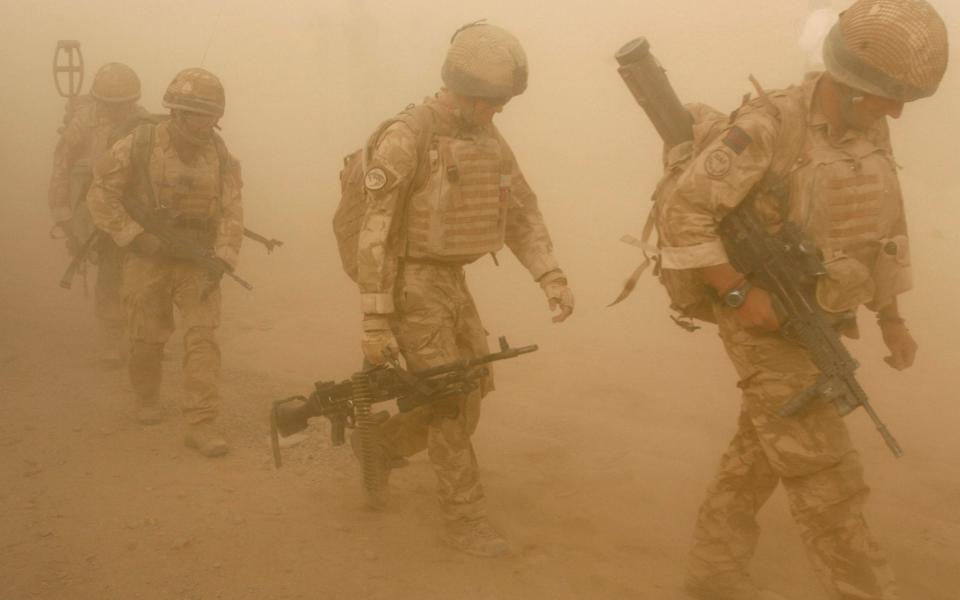Every soldier should be screened for PTSD, former Helmand officer warns, as charity runs out of funding

Every soldier should be screened for PTSD, a former Helmand commanding officer has urged, as a veterans charity reveals it is refusing new cases amid a funding crisis.
Major Richard Streatfeild, a former British Army officer, fought for six months with his men against the Taliban in Afghanistan in 2009. They were engaged in over 800 fire-fights, and were the target of more than 200 improvised explosive devices. Ten men in his company were killed, 50 were wounded.
He has now spoken out and issued a warning that veterans should be tested for mental health issues and “screen as if they were exposed to radiation” after a mental health charity for military veterans said it could no longer take new referrals.
Combat Stress said its income has fallen from £16 million to £10 million in this financial year partly due to a cut in its NHS funding support. It said the decision to turn down new cases had been taken "with great sadness".
Asked whether veterans need to be actively recruited into mental health services, Major Streatfield told BBC Radio 4’s Today programme: “They need to be screened, it's a bit like being exposed to radiation.

“So on the battlefield you had this high trauma exposure, we had 800 firefights we had 200 roadside bombs in six months, we lived on the precipice of life and that means that you have post traumatic stress because you have lived so close to the edge.
“Now those people are tough, they are resilient, they've been trained, they're not the same as the civilian population and they try and cope with that all the way through until in the end by not seeking help they actually undo themselves, and in the case of Jamie Davies, thought that the best thing that he [thought] could do was end his life and that is a tragedy, an absolute tragedy, because it's so unnecessary.”
Mr Davies, a 32-year-old father-of-two who served as a sniper with 4 SCOTS, had been battling with post-traumatic stress disorder (PTSD) after serving with the British Army for more than a decade when he took his own life in August 2018.
During his time with the Army, he completed a tour of Iraq and two in Afghanistan. His death was all the more poignant as the ex-soldier ran a Facebook page for fellow struggling veterans, and posted regular video blogs about his struggles online.
Asked whether the Ministry of Defence (MoD) should take responsibility for the issue, Major Streatfeild added: “Absolutely, I think this is the tip of the iceberg… it affects the NHS, the MoD need to be much more n the front foot about finding the cohort that were exposed to this level of trauma and then treating them.”
He added that 80 per cent of veterans do not get mental health treatment either through the Combat Stress charity or the NHS and argued that it was “simple” for them to be trawled, found and “put into the system” if there were an increase in funding.
He said that while he recognised that the MoD is “conflicted” about this issue as it needs to find new recruits, it also needs to “face up to the problem” and “find some moral courage… to do something about this”.
Combat Stress said that until 2018 it got more than £3 million a year from NHS England, but that now 90% of its funding comes from public donations.
The charity still gets more than £1 million from NHS Scotland and will continue to take on new cases there and in Northern Ireland.
It had been receiving around 2,000 referrals for treatment a year. It will now send all new referrals from England and Wales to the NHS, which Combat Stress said "needs to demonstrate" it can deal with the increased demands.
The charity’s chief executive, Sue Freeth, said: “I can’t offer a service to veterans when I can’t promise to complete it”.
Several organisations and charities have warned of a rise in the number of veterans taking their own lives.

Last September, Mr Mercer, a former Army captain, vowed to provide veterans with the "best mental health care in the world" after saying post-combat stress "ripped apart" those he served with.
Mr Mercer, said: “Any veteran suicide I take personally, and my thoughts are with Jamie’s family and friends at this time.
“I am determined to tackle this issue and I have instructed my team in the MoD to look at every single case to ascertain whether we could or should have done more, so we can learn lessons and put an end to this situation.
“There is a range of help available. I am determined to do all I can to make sure that veterans know where they can turn to in times of need.”
A spokesman for the NHS said: "Our number one priority is providing the best care for veterans and, after listening to what they wanted and a competitive process, the NHS has rolled out new specialist services to every part of the country which have seen over 10,000 people to date and are funded by more than £10 million every year.
"For anyone who has served in the Armed Forces and may be experiencing mental health difficulties help is available through speaking to their GP or contacting the dedicated NHS services directly."

